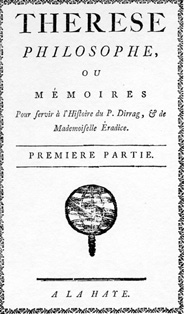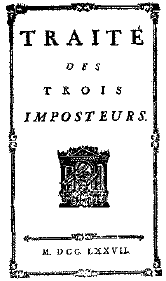18th century in literature
From The Art and Popular Culture Encyclopedia
| Revision as of 10:54, 28 December 2020 Jahsonic (Talk | contribs) ← Previous diff |
Revision as of 15:38, 7 April 2021 Jahsonic (Talk | contribs) Next diff → |
||
| Line 1: | Line 1: | ||
| + | {| class="toccolours" style="float: left; margin-left: 1em; margin-right: 2em; font-size: 85%; background:#c6dbf7; color:black; width:30em; max-width: 40%;" cellspacing="5" | ||
| + | | style="text-align: left;" | | ||
| + | "In the 18th century, literature was not so widespread as in the 19th century, since [[cheap paper|paper was still quite expensive]]."--Sholem Stein | ||
| + | |} | ||
| [[Image:Therese Philosophe Original edition.jpg|thumb|right|200px|''[[Thérèse Philosophe]]'' ([[1748]]) was ''the'' bestseller of the [[French Enlightenment]]]] | [[Image:Therese Philosophe Original edition.jpg|thumb|right|200px|''[[Thérèse Philosophe]]'' ([[1748]]) was ''the'' bestseller of the [[French Enlightenment]]]] | ||
| [[Image:Honoré Gabriel Riqueti de Mirabeau, pained by Joseph Boze.jpg|thumb|right|200px|[[Comte de Mirabeau]]'s [[18th century literature|18th century story]] ''[[Le Libertin de qualité]]'' was brought to [[television]] in the [[late 20th century]] series ''[[Série rose: Les Chefs d’œuvre de la littérature érotique]]'']] | [[Image:Honoré Gabriel Riqueti de Mirabeau, pained by Joseph Boze.jpg|thumb|right|200px|[[Comte de Mirabeau]]'s [[18th century literature|18th century story]] ''[[Le Libertin de qualité]]'' was brought to [[television]] in the [[late 20th century]] series ''[[Série rose: Les Chefs d’œuvre de la littérature érotique]]'']] | ||
| [[Image:Traité des trois imposteurs.gif|right|thumb|200px|''[[Traité des trois imposteurs]]'' by [[Anonymity in publishing|anonymous]] (date unknown, edition shown [[1777]])]] | [[Image:Traité des trois imposteurs.gif|right|thumb|200px|''[[Traité des trois imposteurs]]'' by [[Anonymity in publishing|anonymous]] (date unknown, edition shown [[1777]])]] | ||
| {{Template}} | {{Template}} | ||
| - | :All in all, literature was not so widespread as in the following century, since paper was still quite expensive, see [[cheap paper]]. | + | |
| [[Literature]] of the [[18th century]] refers to [[world literature]] produced during the [[18th century]]. The 18th century saw the development of the [[modern novel]] as literary genre, in fact many [[First novel in English|candidates for the first novel in English]] date from this period. Subgenres of the novel during the 18th century were the [[epistolary novel]], the [[sentimental novel]], [[Histories (history of the novel)|"histories"]], the [[gothic novel]] and the [[libertine novel]]. 18th Century Europe started in the [[Age of Enlightenment]] and gradually moved towards [[Romanticism#Art and literature|Romanticism]]. In the visual arts, it was the period of [[Neoclassicism]]. | [[Literature]] of the [[18th century]] refers to [[world literature]] produced during the [[18th century]]. The 18th century saw the development of the [[modern novel]] as literary genre, in fact many [[First novel in English|candidates for the first novel in English]] date from this period. Subgenres of the novel during the 18th century were the [[epistolary novel]], the [[sentimental novel]], [[Histories (history of the novel)|"histories"]], the [[gothic novel]] and the [[libertine novel]]. 18th Century Europe started in the [[Age of Enlightenment]] and gradually moved towards [[Romanticism#Art and literature|Romanticism]]. In the visual arts, it was the period of [[Neoclassicism]]. | ||
Revision as of 15:38, 7 April 2021
|
"In the 18th century, literature was not so widespread as in the 19th century, since paper was still quite expensive."--Sholem Stein |

|
Related e |
|
Featured: |
Literature of the 18th century refers to world literature produced during the 18th century. The 18th century saw the development of the modern novel as literary genre, in fact many candidates for the first novel in English date from this period. Subgenres of the novel during the 18th century were the epistolary novel, the sentimental novel, "histories", the gothic novel and the libertine novel. 18th Century Europe started in the Age of Enlightenment and gradually moved towards Romanticism. In the visual arts, it was the period of Neoclassicism.
Although the modern novel as literary genre solidified, literacy rates were still very low as there was no primary education for the common man.
The English novel became a popular form in the 18th century, with Daniel Defoe's Robinson Crusoe (1719) and Samuel Richardson's Pamela (1740). Another very popular form was the Gothic novel (The Castle of Otranto, 1764) and its European equivalents the roman noir in France and the Schauerroman in Germany.
Early European bestsellers were Julie, or the New Heloise by Rousseau and The Sorrows of Young Werther by Goethe.
There was already literature of subversion such as that from Voltaire and Sade and other libertine writers. In the United Kingdom there was the renegade publisher Edmund Curll known for his radical pamphlets and bawdy books.
A good introduction to this period, one which describes the popular literature of that era in France very well, is The Forbidden Best-Sellers of Pre-Revolutionary France.
Contents |
Publishers
In the United Kingdom there was the renegade publisher Edmund Curll known for his radical pamphlets and bawdy books.
In the rest of Europe there was Pierre Marteau, used as a collective pseudonym by publishers who wished to stay anonymous. See anonymity in publishing.
see publishers
Chronological list of authors
- Daniel Defoe (1659/1661 [?] – 1731)
- Delarivier Manley (1663 or c. 1670 - 1724)
- Jonathan Swift (1667 – 1745)
- Giambattista Vico (1668 – 1744)
- Voltaire (1694 – 1778)
- Abbé Prévost (1697 - 1763)
- Claude Prosper Jolyot de Crébillon (1707 - 1777)
- John Cleland (1709 – 1789)
- David Hume (1711 – 1776)
- Jean-Jacques Rousseau (1712 – 1778)
- Denis Diderot (1713 – 1784)
- Horace Walpole (1717 – 1797)
- Immanuel Kant (1724 – 1804)
- Casanova (1725 – 1798)
- Restif de la Bretonne (1734 – 1806)
- André de Nerciat (1739 - 1800)
- Marquis de Sade (1740 – 1814)
- Pierre Choderlos de Laclos (1741 - 1803)
- William Blake (1757 – 1827)
- Mary Wollstonecraft (1759 – 1797)
- Ann Radcliffe (1764 - 1823)
Titles
- Robinson Crusoe (1719)
- Pamela (1740)
- Dom Bougre (1741)
- Le Sopha, conte moral (1742)
- Thérèse Philosophe (1748)
- Les Bijoux indiscrets (1748)
- Fanny Hill (1750)
- Tristram Shandy (1760-1770)
- The Castle of Otranto (1765)
- Les Liaisons dangereuses (1782)
- The 120 Days of Sodom (1785)
- The Mysteries of Udolpho (1794)
- La Religieuse (1796)
- The Monk (1796)
- L'Histoire de Juliette (1797)
The Enlightenment
The 18th century in Europe was The Age of Enlightenment and literature explored themes of social upheaval, reversals of personal status, political satire, geographical exploration and the comparison between the supposed natural state of man and the supposed civilized state of man. Edmund Burke, in his A Vindication of Natural Society (1757), says: "The Fabrick of Superstition has in this our Age and Nation received much ruder Shocks than it had ever felt before; and through the Chinks and Breaches of our Prison, we see such Glimmerings of Light, and feel such refreshing Airs of Liberty, as daily raise our Ardor for more"
See also
- 18th century philosophy
- 18th century literature by year
- French literature of the 18th century
- The novel and new psychology in the 18th century
- List of years in literature: the 1800s
- Literary neoclassicism
- English literature: Augustan literature, British amatory fiction
- German literature: German Romanticism, Sturm und Drang
- Enlightenment literature
- Neoclassical literature
- Causes of the French Revolution



